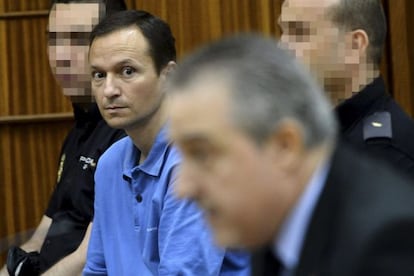Police officer testifies against father accused of murder of two children
Agent tells court of Bretón's erratic behavior and the confession he retracted

José Bretón had two books on his bedside table. One was The Shining by Stephen King; the other was How to Make Friends and Influence People . This was one of the things that caught the eye of the policeman who was assigned to follow José Bretón while searches were conducted for his missing children between October 10 and 17, 2011.
It wasn't the only surprise in store for this officer, who shadowed Bretón - the main suspect in the disappearance - in a bid to earn his trust and get him to admit any knowledge of his two young children's whereabouts.
On Monday, the police officer testified for over two hours at the trial against Bretón for the double murder of Ruth, aged six, and José, aged two, on October 8, 2011. The prosecution claims that Bretón drugged and murdered his children and cremated their bodies in a homemade pyre on the family estate of Las Quemadillas, outside Córdoba. The father maintains that he simply lost sight of his kids while they were playing in a park.
The prosecution believes that Bretón's motive was clear and personal: he wanted to take revenge against the children's mother, Ruth Ortiz, who had asked him for a divorce. Prosecuting attorneys are requesting a 40-year sentence.
The subject of his missing children did not seem to interest him at all"
The police witness mentioned the suspect's cold attitude toward his children. He also mentioned that Bretón verbally abused his wife and reacted suspiciously to the discovery of prescriptions for drugs that investigators believe he used to poison his kids.
Moreover, the officer noted Bretón's unusual attitude as he stood in front of the remains of the bonfire where he is thought to have burned the bodies at a very high temperature, to avoid leaving any recognizable remains behind. Eventually, forensic experts determined that several teeth found at the site belonged to humans of the same age range as the two missing children.
The law enforcement official emphasized Bretón's erratic behavior. "I was always surprised," said the officer. "I wasn't expecting such a cold, unemotional, distant kind of person. He didn't have the normal guilty feelings that parents experience in similar situations. The subject of his children did not seem to interest him at all."
That is why, before Bretón was formally charged and arrested, the law enforcement agent struck up a random conversation with him in an attempt to bring up the subject in a roundabout manner. On occasion, he noted, Bretón's impassive façade seemed to crack, like the time when investigators found the drug prescriptions.
"Bretón was standing there, all rigid and wild-eyed. 'Where are the pills?' I asked him. 'I don't know,' he replied. 'Where did you buy the pills?' I insisted. 'I can't remember,' he said. I didn't ask any more questions, but I didn't like this pill business at all," the officer testified.
Then, on October 17, tired of all the hazy responses, the policeman took Bretón back to the bonfire site and asked if this place brought back memories. "He didn't reply, and he just hung his head low. I insisted: 'Are the children here?' And he answered: 'Nearby. Go ahead and arrest me'."
Then when they walked into the house, Bretón sat down on a couch and placed his head between his hands. "I told my superiors that this man had killed his children and that he was asking to be arrested," says the law enforcement agent.
However, Bretón later retracted his confession. He has since maintained that he doesn't know where Ruth and José are.
Tu suscripción se está usando en otro dispositivo
¿Quieres añadir otro usuario a tu suscripción?
Si continúas leyendo en este dispositivo, no se podrá leer en el otro.
FlechaTu suscripción se está usando en otro dispositivo y solo puedes acceder a EL PAÍS desde un dispositivo a la vez.
Si quieres compartir tu cuenta, cambia tu suscripción a la modalidad Premium, así podrás añadir otro usuario. Cada uno accederá con su propia cuenta de email, lo que os permitirá personalizar vuestra experiencia en EL PAÍS.
¿Tienes una suscripción de empresa? Accede aquí para contratar más cuentas.
En el caso de no saber quién está usando tu cuenta, te recomendamos cambiar tu contraseña aquí.
Si decides continuar compartiendo tu cuenta, este mensaje se mostrará en tu dispositivo y en el de la otra persona que está usando tu cuenta de forma indefinida, afectando a tu experiencia de lectura. Puedes consultar aquí los términos y condiciones de la suscripción digital.








































